How To Have More Time: The Best 8 Quick Fixes

Let’s face it: your “to-do list” is huge, and there’s not enough time to do everything. So, if you feel exhausted, guilty or frustrated–this post is just for you. Here are 8 unconventional but easy techniques for how to have more time in your day. These shifts will make a difference in how overwhelmed you’re feeling and free up time.

How To Have More Time: There Is Never Enough Time
For years, I had a very stressful 9-5 in a bureaucratic agency, often taking work home and dealing with unsupportive management. Part of my job included regularly managing crises, and I experienced vicarious trauma from the tragic life stories of the clients I served.
I also had two energetic infants at home, struggled with undiagnosed anxiety disorders, ran an online business, took courses, plus organized and developed a side hustle every spare minute I had. Then, my father passed away, and life became even more complicated.
Working moms are often in the same boat or, worse, experiencing a similar feeling of overwhelm or are in much more challenging situations given their life circumstances.
Like many women, I kept going and going and going until I couldn’t go anymore—literally.
You Are Not The Problem
If you’re blaming yourself for not having enough time to do what needs to get done, I hear you.
When you wake up in the morning already overwhelmed by the day ahead, I’ve been there.
If you’re frustrated that you’re not organized enough or feel like you need better time-management skills, you are not the problem.
You are enough, and you’re doing enough.
The Impact of Trying To Do It All
The truth is you have way too much going on simultaneously. There’s no way anyone could get it all done without a significant impact on their emotional and physical well-being.
For me, that manifested in regularly being sick—flu, regular headaches, chronic stomach issues, etc.
I was also emotionally exhausted, blamed myself for every mistake, and often wondered what was “wrong” with me. I did my best to hold it together. I even looked the part of a put-together, happy working mom, but it was a different story behind the scenes.
For you, it might be back pain, depression, feeling like a failure, constantly feeling guilty or not sleeping well. There are so many physical and emotional impacts of stress on our bodies and minds.
Related article: 15 Powerful Ways to Simplify Your Life
The Trap of Time-Management
The idea of conquering time isn’t realistic—it’s more of a trap and places pressure on already overwhelmed women. We could all improve in some areas of time management, but we still wouldn’t have enough time to “do it all.”
The popularity of “hustle culture” and #Girlboss has made things worse by telling us we should juggle everything, have successful careers, be perfect moms, have clean homes plus manicured nails and a perfect blow-out to top it off. 🙄 Talk about exhausting.
This ideal isn’t reasonable because it leaves us depleted and feeling guilty. It also leads us to wonder what we’re missing or where we’re going wrong.
But time management is NOT our problem. The real issue is that we have too much on our plates. We have unrealistic expectations and beat ourselves up when we can’t keep up.
Yes, we have to put in hard work to accomplish goals, but it doesn’t have to be at the expense of our health.
What we need is to take better care of ourselves and rest.
Poet Rupi Kaur articulates this point beautifully:
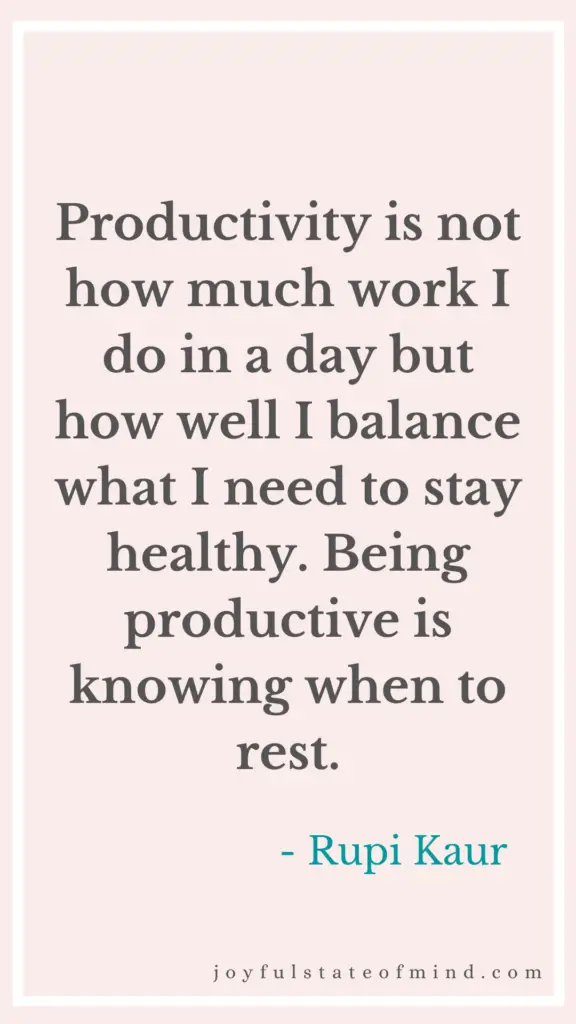
How To Have More Time: The Best 8 Quick Fixes
Here are eight surprising but effective ways to create more time for rest and reduce stress. There’s no pressure to try all of them; just start with one or maybe two and go from there.
1. Watch Yourself.

If you feel like you never have enough time, tracking how you spend your time can be an eye-opening activity.
It’ll give you insight into where you can improve and what habits are unnecessarily draining time.
You can use your notes app on your phone or paper if you prefer.
But a few apps make time-tracking quick and painless. Here are a few:
After you figure out where your time goes, you can eliminate time wasters. For example, constantly refreshing your Instagram feed, mindless online browsing, frequently checking your email, taking forever to perfect your social media posts, etc.
You’ve probably heard of the “eat the frog” technique, which is doing the difficult or dreaded task(s) first thing in the morning to get it out of the way, and if that works for you, that’s awesome.
But if you’re not a morning person and that doesn’t work, try to figure out what time of the day you’re most efficient and schedule more challenging tasks in that time.
Side note: We all have different levels of energy at different times, and it’s pretty apparent in my family. My oldest daughter and I spring out of bed bright-eyed and ready for the day, whereas my hubby and little one slowly and sometimes painfully get out of bed.
2. Add a Buffer.
Adding some buffer time simply means blocking off extra time between activities. If you don’t plan any margins between activities or meetings, it’s easy to fall off track, and this causes immediate stress.
Then, if things don’t go as planned, you have spare time, which helps ensure you get tasks done.
Bonus: You may even have time to do some quick self-care, which will help with stress levels and make you more productive. For example:
- Deep breathing for a few minutes.
- Reading something inspirational.
- Grabbing a healthy snack and drinking more water.
- If you’re working at home, cuddling or playing with your pet is a calming and fun self-care activity.
- Get your body moving for 5 minutes, whether you dance to your favourite song, do a 5-minute workout or try this relaxing 5-minute stretching routine:
Side note: I was stuck on the “I need to squeeze every last thing into every last minute of the day” kind of mindset. No surprise, I was constantly exhausted and would quickly burn out.
My hubby mentioned the idea of buffer time as his mindset is “work smarter, not harder.” He keeps me accountable and regularly reminds me as it’s hard to break out of the rat race mentality.
3. Be Your Own BFF.

Even though being kinder to yourself may seem an unlikely way to create more time, it’s probably the most important point I’m sharing. You can read more about my personal story on this here.
This scientific article points out how self-compassion leads to increased productivity and decreased stress levels.
For example, self-compassion gives you peace of mind, and when you can be calm in the face of failure or rejection, this gives you a higher level of well-being so you can be more productive and successful. (1)
Also, when you’re self-critical, that activates your nervous system and increases your stress hormones. (2) That harsh inner critic can stop us from learning and being resilient. (3)
People with self-compassion show themselves grace when they make a mistake.
This creates more time as you waste less time trying to perfect or procrastinate. Perfectionism and procrastination are significant stressors and thieves of time.
Being kinder to yourself is one of the secrets to going from merely surviving life to thriving.
BONUS: When you join my newsletter I’ll send you a free handy cheat sheet so you can easily reference these techniques:
The Master Key to Unlocking More Free Time & Reduce Stress: 8 Easy + Unconventional Techniques.4. Put Blinders On.
Not everything is in our control, but when it comes to having more time and reducing stress, do your best to take control of distractions like emails and social media. Think of it as putting blinders on. 😎
Emails and social media take up time and are constant interruptions in our daily lives. Unfollow social media accounts that don’t bring anything positive into your day or trigger insecurities.
Unsubscribe from companies that send multiple emails a day or lists that always push products instead of adding value to your day.
Try having a set schedule for checking email, such as twice a day. If possible turn off notifications because they are programmed distractions designed to get you onto apps.
All of these little adjustments will free up time, anywhere from 30 minutes to 2 hours depending on your habits.
Side note: I had an unhealthy relationship with email and social media, especially after the pandemic. I always had my phone on me and would constantly check emails and refresh my social accounts. Sometimes out of boredom and sometimes for social interaction, but they both became habits that were eating up my time. 🤦🏻♀️
How I overcame this: I got into the habit of leaving my phone in another room when I was not working. It sounds simple and easy, but it takes effort and discipline. I also removed some social media apps from my phone. This has helped me feel less anxious and freed up time to do things that matter and make me happy. 🎉
5. Work With Your Body’s Rhythm.

I know it sounds cliche but never underestimate the power of going to bed and waking up at the same time every day.
Our bodies and minds benefit from a regular sleep-wake cycle, a well-known circadian rhythm that acts as the body’s internal clock. This internal clock in your brain helps guide your body to know when to sleep and when to wake up using environmental factors like light. (4)
Experts recommend at least 7 hours of sleep for adults and 12 for kids and teens, but getting sleep is not enough. It needs to be quality sleep, which is where having a regular sleep schedule comes in. (5)
Having a healthy sleep schedule is an easy way to gain more time and have more energy. When you learn to work with your body’s rhythm, you will feel the difference and accomplish more. 💃🏽
Related article: 14 Quick Stress-Relievers for Women
6. Stop Making “No” The Bad Guy.
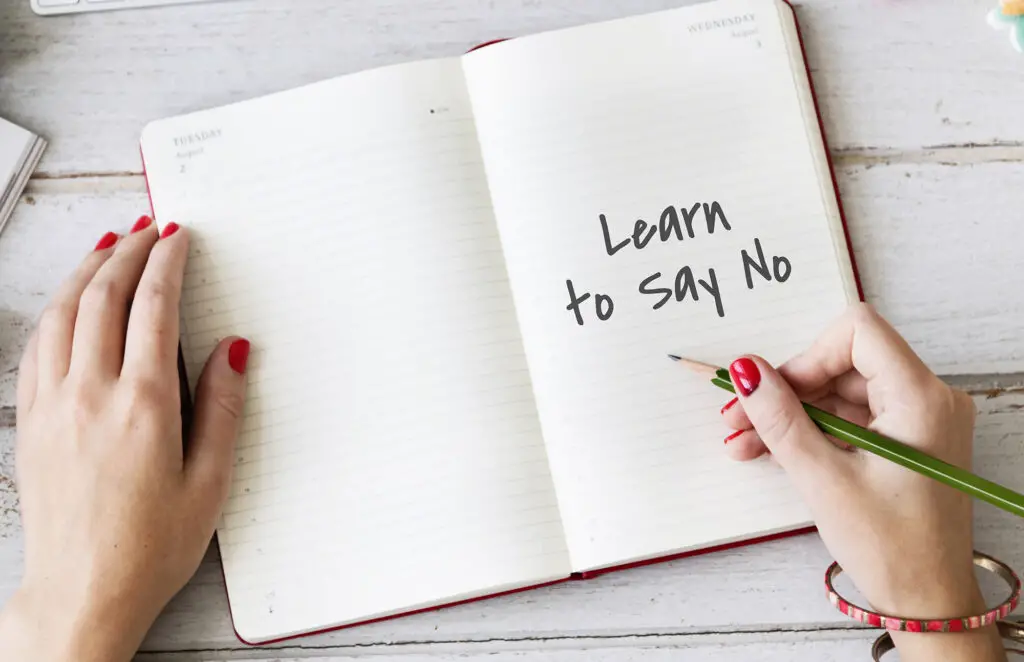
When you’re overcommitted, it’s no surprise that you’ll be less productive and have less time. Getting comfortable with personal boundaries and saying no is essential to reduce stress and have more time in your day.
Stop making “no” the bad guy and instead embrace the power of using it wisely.
According to Psychology Today, the habit of people-pleasing and struggling to say no comes out of literature on depression. (6)
People-pleasing is directly related to mental health, so being able to say no to requests is vital to your emotional well-being.
After you get comfortable with declining new commitments, it won’t feel daunting. Plus, you’ll have more time for what matters most. If this is an area where you struggle, check out the post below.
Related article: How to Stop Being a People-Pleaser But Still Be Nice: 8 Secrets
7. Embrace Monotasking.
Have you ever noticed how good you feel after taking small steps? That’s because it gives you a sense of accomplishment, builds momentum, and fuels your productivity.
The trick is to start small and make progress because our minds can’t multitask—setting aside time to do one thing at a time works best.
According to neuropsychologist Dr. Kubu, humans are wired to be “monotaskers,” which means our brains can only focus on one task at a time. (7)
Some studies have found multitasking, such as texting or being on social media when in a lecture, leads to students learning less and even decreasing their accuracy with homework. (8)
If something is going to take a long time, divide it up. Don’t try to tackle it all at once, or you’ll have stress from the get-go.
I’ve always been inspired by this motivational speech from U.S. Navy Admiral Seal W. H. McCraven. One of the things he speaks about is the importance of accomplishing small tasks:
8. How To Have More Time: Leave Things Undone.

Being a time-management guru or productive 24/7 are unrealistic standards; give yourself breathing room and crush that mean inner critic.
Get comfortable with slowing down, it’s wise and essential to take time to pause and rest. It’s perfectly okay to pause during the day and leave things undone. ✅
Let’s celebrate all the things we accomplish in a day because everything we do is impressive and kind of mind-blowing.
Think about it–our responsibilities are endless, from taking care of others, making meals, errands, medical appointments, volunteering, not to mention having a job, plus running a blog or side hustle, and we still manage to get our makeup on.
A Harvard Business Review article argues that time management is more of a trap and won’t save you time. Rather, we need strategies that help us eliminate tasks rather than trying to accommodate them all. (9) 👏 Amen to that!
These powerful quotes by Chinese writer and philosopher Lin Yutang sum up and were the inspiration behind this point:
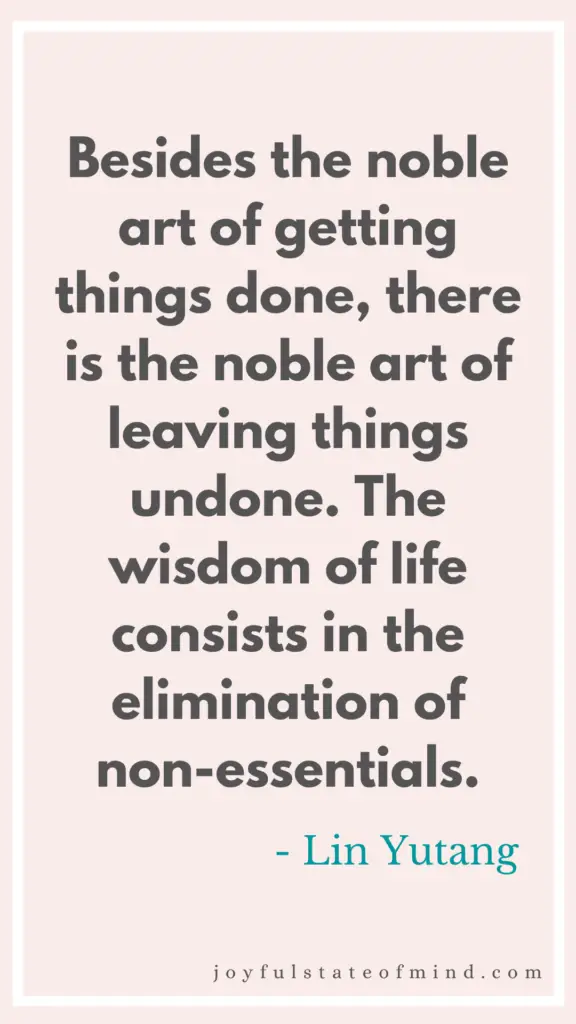
“Besides the noble art of getting things done, there is the noble art of leaving things undone. The wisdom of life consists in the elimination of non-essentials.”
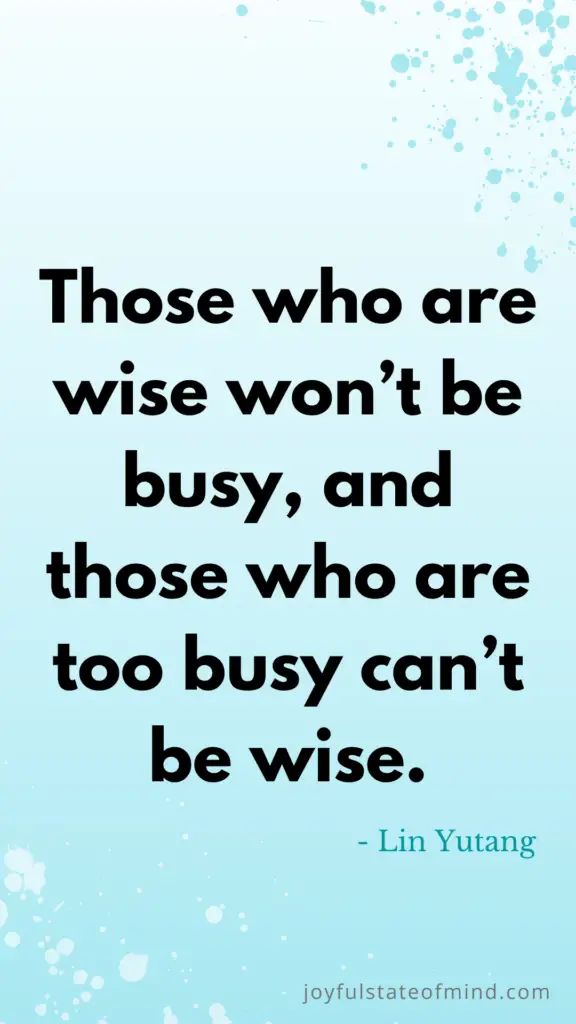
“Those who are wise won’t be busy, and those who are too busy can’t be wise.”
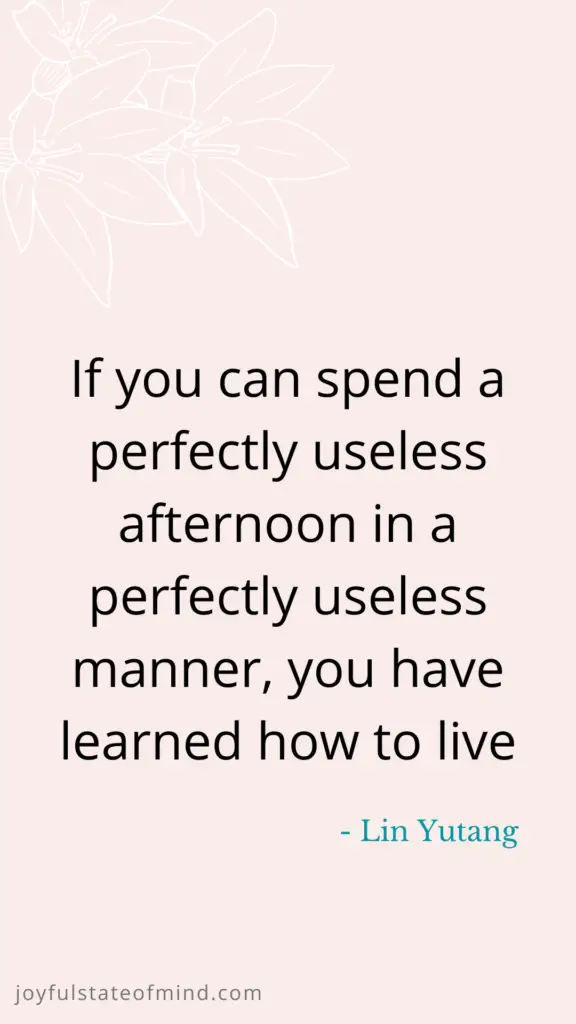
“If you can spend a perfectly useless afternoon in a perfectly useless manner, you have learned how to live.”
How To Have More Time: The Surprising Secret Key
After years of chronic stress and ignoring warning signs my body and brain were giving me, I was completely burnt out.
It wasn’t until my doctor told me I needed time off work that things started to change. She had concerns and knew it wasn’t sustainable to go on this way, given my ongoing physical and emotional health issues.
After learning it’s okay to rest and using the strategies I’ve shared above, I began seeing and feeling a shift in my life. More rest is essential to reduce stress and increase productivity. Think of rest as an investment in productivity and your future success.
I’m no longer focused on trying to accomplish everything on my to-do list, I’ve slowed down and focus on progress instead of trying to climb Mt. Everest every single day. Life is more joyful and less stressful. But the first step was this: To start being as kind to myself as I was to others. That’s the surprising secret key to unlocking a better life, and I want to help get you there, too.
Related article: How to Make a Bad Day Better: 10 Quick Strategies
Let’s Get Through This Together.
I’d love for you to become a part of the Joyful State Of Mind community so we can stay connected. You’ll receive biweekly emails with practical tips and tricks to go from constantly stressing about everything to thriving. Click the link below to sign-up. I can’t wait to connect. 😘
As a bonus, I’ll send you this FREE handy cheat sheet:
The Master Key to Unlocking More Free Time & Reduce Stress: 8 Easy + Unconventional Techniques.
RESOURCES:
1 The Scientific Benefits of Self-Compassion
2 same as above
3 same as above
4 What Is Circadian Rhythm? | Sleep Foundation
5 The Importance of Sleep Schedules
6 People Pleasing: Short-Term Benefits and Long-Term Costs | Psychology Today Canada
7 Why Multitasking Doesn’t Work
8 Multicosts of Multitasking
9 Time Management Won’t Save You




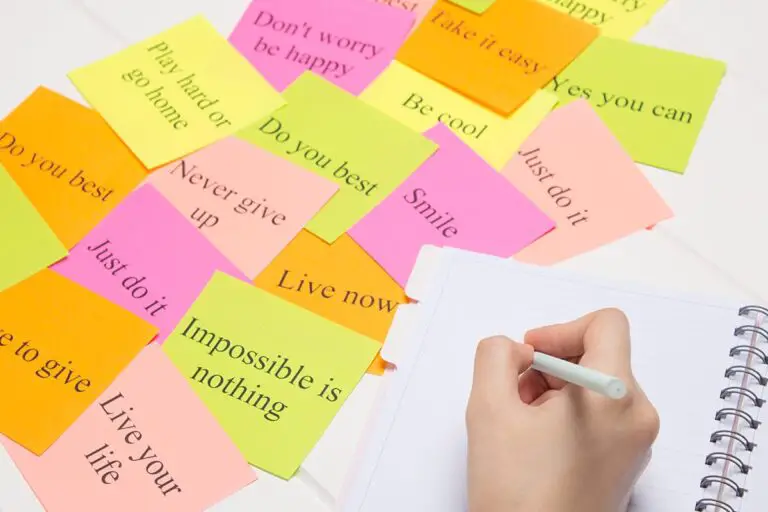

Thank you SO much for writing this post, Martha! It couldn’t have come at a more perfect time for me. I feel every single word throughout this post, and I have my cheat sheet at my desk. 🙂 I am definitely going to start implementing these into my life. Saying ‘no’ is a big one for me, but I am finding it more and more necessary to create a better life.
For those of you who aren’t subscribed and may see my comment, it is pure gold, just like this post!
Make Life Marvelous
Hi Ashley, thanks for your comment; it made my day. I’m so glad this came at the right time for you and to hear you have the cheat sheet at your desk. I do too:-) It helps me stay on track and remember I don’t have to do it all or pressure myself. I hear you; saying no is challenging for so many people, but it does get easier as you get more comfortable with practice.
This post came at the right time to start the new year! You make such a great point that it’s not time management, we just have too much on our plates! I’m always multi-tasking and find that many times I’m making mistakes and things take me even longer because I have to redo them. I’m definitely going to be focusing on mono-tasking this year and utilizing a time tracking app! I also love the idea of being able to leave some things undone!
Jill – Doused in Pink
Hi Jill, I’m happy that point about time management resonated with you because we can be so hard on ourselves and often have unrealistic expectations that would be impossible for anyone to meet. That’s very true; when we multitask, we make more mistakes and often take longer having to do things over again. Monotasking has been a big one for me, and not pressuring myself to get every single thing on my list done is a powerful mindset shift.
What an amazing post Martha! Self compassion is something I need to work on and monotasking is an idea that sounds interesting. These apps for time tracking sound great and I will have to take a look at trying one. Thanks for sharing all this tips which will really help me be better prepared mentally for my recital ahead.
https://www.kathrineeldridge.com
Thanks for the kind message, Kathrine! Self-compassion is a life-changer; more and more experts are starting to realize that too which is great. I hope monotasking and time tracking will help you. Please let me know how it goes. I would love to hear about your experience. I hope you have a great recital, sounds exciting!
These are all wonderful points and tips! I do need to focus on monotasking and check out some of those apps you recommended! Thanks for writing such a wonderful post!
Thanks so much, Laura! So glad to hear monotasking and time tracking are two things people will be trying. They are so helpful when it comes to reducing stress and having time in your day:)
Super in-depth post, I’ve shared it with my boyfriend. He is a perfectionist and the amount of time he wastes trying to achieve perfection with his work honestly kills me. He needs to learn this tips.
Ana | La Belle Society
http://www.labellesociety.com